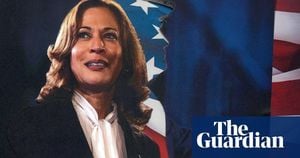Recent elections have heightened tensions across the United States, leading to significant social divisions, particularly within families and friendships. Following Donald Trump's historic election win, many Americans are questioning their relationships with those who supported him, leading some to sever ties entirely. The sentiment is especially prevalent among individuals worried about their rights and the moral consequences of supporting the Trump administration.
This phenomenon is not simply about political disagreements; many feel their values are at stake. One anonymous individual shared, "I cut most of my family off in 2016 after they voted for Trump for the first time. It started with a picture of a young Syrian boy who drowned. From the following conversations, I learned my cousin believes her children are worth more than this child. ... Our morals and values were nothing alike. Now, I have no contact with anyone from my 'family' because they voted for someone who doesn't care about my career helping children or my LGBT+ child losing their right to marry." The emotional depth of this response reflects the struggles faced by people who find their values threatened by loved ones' political choices.
Similarly, another person detailed the heartbreak of watching their friend remain indifferent to life-saving healthcare policies. "My good friend has spent moments at our home but was still OK with my spouse losing his healthcare if it saved her on taxes," they recounted. This type of disconnection often leads to deep feelings of betrayal and sadness. The personal stakes of these political affiliations weigh heavily on those who have to make such difficult decisions.
The division isn’t uniform, of course. Some individuals still attempt to maintain relationships, choosing to overlook political differences for the sake of long-standing connections. Yet others like one respondent stated, "I had to cut out most of my family on both sides, who are far-right evangelical. They are celebrating Trump’s victory and calling out how happy they are with his plans. I don’t want to associate with people who are okay with women bleeding out because their 2000-year-old book says so." This highlights the moral divergence felt among family members and friends.
For some, the stakes are even higher. One individual reflected on their decision to cut ties with their youngest brother, noting how his acceptance of Trump's misogynistic views turned their relationship irreparably strained. "He believes like Trump does — any woman who makes complaints against men is just being petty. That was the moment I knew I couldn't engage with him any longer. Would he think the same of my wife or daughters?" The personal ramifications of these political statements can lead to painful consequences, severing lifelong bonds.
Other narratives shared included relationships negatively impacted by misinformation and lack of science-based consensus on public health issues. One person lamented cutting off their childhood friend who had begun to challenge vaccine safety, saying it became too triggering after losing family members to COVID. They explained, "At this point, it’s willful ignorance, and she refused to stop triggering me, so we're no longer friends." It's evident from these stories how the pandemic has also played a significant role, deepening the divides among people overwhelmed by personal loss and public discourse.
Another heart-wrenching tale recounts how financial ties were also affected. "I'm changing my will. The MAGA family members don’t need my money; I’m leaving it to friends who have supported me through my health struggles," shared Carolyn. This displacement of familial legacy shows how political alignments are becoming barriers not just to relationships but to support systems.
There are even instances where romantic relationships have crumbled under the strain of differing political beliefs. One person mentioned their boyfriend’s support for Trump. "Trying to talk to him about why I’m against him has become impossible. He doesn't listen and dismisses major issues concerning women’s rights, immigration, and racism as just noise. I find his views so abhorrent I feel disgusted with him; I cannot be with him any longer," they said. This highlights how the political climate isn't just affecting friendships and family but also romantic alignments.
The cacophony of responses from these stories portrays not only the emotional devastation wrought by political divides but also the broader cultural rifts forming across America. A simple act of voting has morphed for many from participation in democracy to existential declarations of value systems. Those who once shared meals now face disconnection forged from opposing political ideals, all stemming from disagreements about who should lead the country.
The impulse to create boundaries is spurred by feelings of self-preservation and emotional safety during what many perceive as chaotic times. These stories paint portraits of individuals grappling with the fallout of the Trump election, where the personal stakes feel insurmountable, sparking open conversations and reflections about relationships and values. This ever-widening rift serves as a reminder of how politics can transform personal landscapes, often forcing the hand of individuals to reconsider connections and community.
Admittedly, some still ponder the wisdom of such drastic measures. One might wonder if there's value—to the relationship and to social cohesion—as they sift through their experiences. Yet, with numerous respondents expressing their deep pain and fear during this pronounced era of division, it becomes clear: for some, the need to protect what they hold dear absolutely outweighs the preservation of fractured friendships and familial ties.
Despite these severances, many believe there's still potential for healing as society grapples with the challenges posed by differences. Engaging conversations about these divisions could plant the seeds for empathy and perhaps even reconciliation as the nation continues to navigate its way through these turbulent political waters. Understanding and addressing these chasms among us might be the first steps toward bridging the divides, if and when individuals feel safe enough to reconnect.
Through these narratives, it’s clear—political identity is becoming personal. Even as stories of loss mount, the hope for future dialogue remains strong, pointing toward the potential for growth, healing, and unity amid tumultuous times.



